
Five actions are available to you in the first round. We will cover these first:
1. Forage for Ingredient
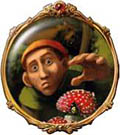
To find the ingredient you want, sometimes you have to spend a little extra time in the forest. Be sure to bring a stout walking stick to ward off wolves, bears, and rival alchemists.
When it is your turn to forage for an ingredient, you may take either 1 face-up ingredient from the row or draw 1 random ingredient from the top of the deck. Cards in the row are not replaced, so players who play later may have a more limited choice. Once all the face-up cards are gone, your only choice is to draw from the top of the deck. (Or you can always decline the action and move your cube to the unused cubes space).
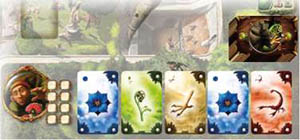
Once all players have finished their actions here, remove any remaining face-up ingredients from the board and put them in the discard pile face down. A new set of 5 face-up ingredients will be dealt at the beginning of the next round.
2. Transmute Ingredient
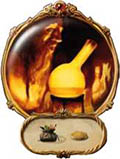
This venerable alchemist has discovered how to turn ingredients into gold. He'll be happy to share the gold if you'll supply the ingredients. Maybe he's too old to forage for himself. Or maybe he just dislikes getting up early enough to beat the other foragers.
When you play this action, discard 1 ingredient and take 1 gold piece from the bank. On this space, going first does not give you any advantage.
Whenever you discard ingredients, no one else gets to see what you discarded. The discard pile should always be face down.
Tip: This is a quick way to get the gold piece you really need ... or an inefficient way to get the two gold pieces you really, really need. Skilled alchemists, however, will make most of their money by earning grants and selling potions to adventurers.
3. Buy Artifact

Nothing says "success" like a shelf full of expensive hardware. When you buy an artifact, take one of the cards in the artifact row and pay the cost in the upper left corner. Keep your artifacts on the table in front of you where everyone can see them.
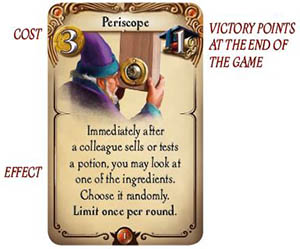
Early artifacts have effects that last the entire game. If an effect does not specify that it is limited to once per round, then you can use it every time it applies.
Other artifacts have an immediate effect that can be used only once. Using this effect is part of your Buy Artifact action. Most artifacts are worth victory points at the end of the game. Some have variable victory points that are explained on the card.
At the beginning of the game, the artifacts row has only artifacts labeled I. The artifact row is not replenished, not even if they have all been taken. During the conference at the end of round 3 (and again at the end of round 5) any remaining artifacts will be discarded and the next three artifacts will be placed in the row. Until then, the II and III artifacts are kept face up on the table so that players can read them and plan ahead.
Here is a list of artifacts and favor cards.
Experiments
The town council has banned tests on animals because of the ... issues ... arising from the winged pig outbreak. So now alchemists have to test their potions on people. Fortunately, the town has a good supply of alchemy students. And in the worst case, you can always try your potion yourself.
The final two actions of the round give you the most information. This is where you mix two ingredients and see what happens. The procedure for mixing a potion is the same whether you are Testing on a Student or Drinking the Potion yourself:
- Choose 2 of your ingredient cards to mix.
- Place them in your cauldron so that no one else can see them.
- Tap
or
, depending on the action space.
- Scan the cards and tap
when the reader recognizes them.
- Show the result to the other players. Yes, they will learn which potion you made, but they will not know which ingredients you used.
- Put the corresponding result token in your results triangle.
- Put the corresponding result token on your player board, to remind the other players that you have made that potion (unless you already have that token there). This is mandatory. Potions you have mixed are public knowledge.
- Discard the ingredients you used. Ingredients are always discarded face down.
(Even if your group has agreed to use the card reader's "select by hand" option, you still put the two ingredients in the cauldron. That way you won't forget to discard them). The major difference between the two actions is what happens when you mix a negative potion. The effects of the
,
, and
potions are quite unpleasant. That's why alchemists have students.
4. Test On Student
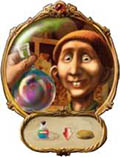
A student will drink anything for science. Until he gets sick. Then he'll drink anything for science and 1 gold piece. The first player to use this action space performs the experiment as described above.
Players who experiment later may be at a disadvantage. Once the student drinks a negative potion, his zeal for science is considerably diminished. For everyone playing after the player who mixed the negative potion, the action costs 1 gold piece. (You always have the option of declining the action and moving your cube to the unused cubes space. If you cannot pay the student's fee, then you must decline the action).
Every round you get a new student - one whose heart burns with the fire of science, one who doesn't know about what happened to the previous student. So the first experiments of the round are always free until someone mixes a negative potion.
5. Drink Potion
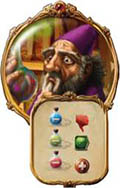
This is the simplest way to find out what a potion does. Of course, it does have some drawbacks.
The advantage to experimenting on yourself is that you do not have to pay any gold pieces. The disadvantage is that the negative potions have an impact on you. The effect is different according to the color of the negative potion you drink:
 This is a potion of insanity. You don't remember drinking it, nor do you remember doing naked cartwheels through the town square. But everyone else remembers.
This is a potion of insanity. You don't remember drinking it, nor do you remember doing naked cartwheels through the town square. But everyone else remembers.
You lose 1 point of reputation.
 This is a potion of paralysis. It's hard to get up in the morning when you can't move your limbs.
This is a potion of paralysis. It's hard to get up in the morning when you can't move your limbs.
 Move your order marker onto this order space. Next round, you will not choose an order space with the other players. Instead you will draw the cards indicated by this special order space and play last.
Move your order marker onto this order space. Next round, you will not choose an order space with the other players. Instead you will draw the cards indicated by this special order space and play last.
This penalty lasts for only one round. If your marker has been on the paralysis space for the entire round, you can move it off when it is time to begin drinking potions, so that no one will confuse your marker with those of players who paralyze themselves now. (Of course, if you drink this potion again, you'll have to put your marker back again).
 Congratulations! You have just survived drinking poison. As a student, you must have built up an immunity. But even so, you don't feel that great. You'll need to spend some time recovering.
Congratulations! You have just survived drinking poison. As a student, you must have built up an immunity. But even so, you don't feel that great. You'll need to spend some time recovering.

Instead of taking your action cube back to your player board, put it on the hospital space. For the next round, you will have 1 less cube to use.
No negative potion can affect you twice in the same round. Positive and neutral potions have no game effect, but you will experience a sensation of deep relief.
Other fun things that can happen to you when you are paralyzed
If multiple players drink a
potion, they will all have their order markers on the green space at the bottom. Those who put their markers there first will play ahead of those who put their markers there later.
If the starting player marker is passed to a player who is paralyzed, the paralyzed player passes the marker to the left.
(The player on the left is getting all the advantages of being starting player, and it would not be fair if the same player got those advantages two rounds in a row).
In the unlikely event that the player on the left is paralyzed, too, the marker keeps going around the table until it gets to an unparalyzed player.
In the incredibly unlikely event that all players are paralyzed, don't pass the marker at all. Next round, the starting player will be the one who would have started this round.
Your First Round
You now know enough to play your first round of Alchemists. Well, almost the entire round. There are a few things that happen after the Drink Potion action space is resolved, but you can read about those details later.
If you want, you can play your first round now. Then, come back here and learn about the other 3 action spaces.
Continue Reading


